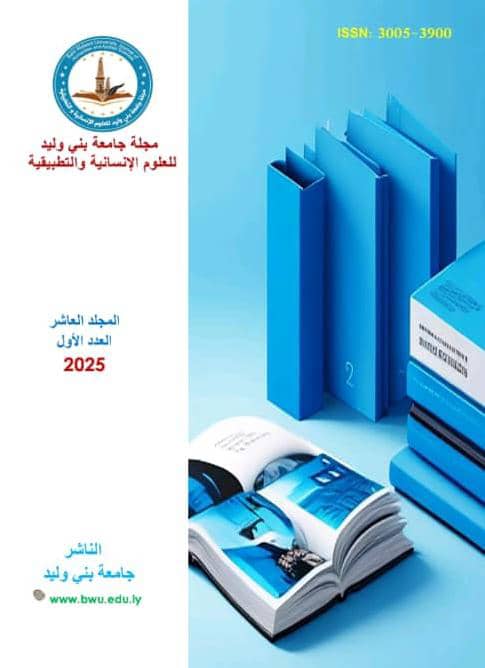The Impact of Educational Materials on Student Motivation in Reading Lessons: A Case Study in Libyan Schools
DOI:
https://doi.org/10.58916/jhas.v10i1.714الكلمات المفتاحية:
Educational Materials, Student Motivation, Reading Lessons, Libyan Schools, Mixed-Methods Approach, Interactive Learning, Engagement, Reading Achievement, Teacher Perceptions, Educational Resource.الملخص
This study examines how educational resources affect students' motivation during reading classes in Libyan schools. A mixed-methods approach was employed, combining both quantitative and qualitative data collection and analysis methods. A survey was administered to 500 students, and interviews were conducted with 20 teachers and 10 school administrators. The results show that educational materials have a significant impact on student motivation in reading lessons. The study found that students who used interactive and engaging educational materials showed higher levels of motivation and interest in reading compared to those who used traditional materials. The study recommends that educators and policymakers prioritize the development and use of interactive and engaging educational materials to enhance student motivation and reading achievement.
التنزيلات
المراجع
L. B. Gambrell, Best practices in literacy instruction, 5th ed., New York, NY, USA: Guilford Publications, 2015.
J. Henderlong and M. R. Lepper, "The effects of praise on intrinsic motivation: A review and synthesis," Psychological Bulletin, vol. 128, no. 5, pp. 774-795, Sep. 2002, doi: 10.1037/0033-2909.128.5.774.
A. Wigfield and J. T. Guthrie, "Relations of children's motivation for reading to the amount and breadth of their reading," Journal of Educational Psychology, vol. 89, no. 3, pp. 420-432, Sep. 1997, doi: 10.1037/0022-0663.89.3.420.
J. T. Guthrie and S. Alao, "Designing reading instruction to promote engagement," The Reading Teacher, vol. 50, no. 8, pp. 658-670, May 1997.
G. Schraw and S. Lehman, "Situational interest: A review of the literature and directions for future research," Educational Psychology Review, vol. 13, no. 1, pp. 23-52, Mar. 2001, doi: 10.1023/A:1009004801455.
S. Hidi and K. A. Renninger, "The four-phase model of interest development," Educational Psychologist, vol. 41, no. 2, pp. 111-127, Jun. 2006, doi: 10.1207/s15326985ep4102_4.
K. A. Renninger, "Individual interest and its implications for understanding intrinsic motivation," in The social psychology of cognition and motivation, J. M. Levine and M. A. Hogg, Eds. Cambridge, UK: Cambridge University Press, 2000, pp. 373-404.
D. I. Cordova and M. R. Lepper, "Intrinsic motivation and the process of learning: Beneficial effects of contextualization, personalization, and choice," Journal of Educational Psychology, vol. 88, no. 4, pp. 715-730, Dec. 1996, doi: 10.1037/0022-0663.88.4.715.
E. L. Deci, R. Koestner, and R. M. Ryan, "A meta-analytic review of experiments examining the effects of extrinsic rewards on intrinsic motivation," Psychological Bulletin, vol. 125, no. 6, pp. 627-668, Nov. 1999, doi: 10.1037/0033-2909.125.6.627.
A. Wigfield and K. Ecclestone, "Expectancy-value theory of motivation," Contemporary Educational Psychology, vol. 25, no. 1, pp. 68-81, Jan. 2000, doi: 10.1006/ceps.1999.1015.
D. H. Schunk, Learning theories: An educational perspective, 4th ed., Upper Saddle River, NJ, USA: Pearson Education, 2003.
P. R. Pintrich, "A conceptual framework for assessing motivation and self-regulated learning in college students," College Student Journal, vol. 38, no. 3, pp. 345-354, Sep. 2004.
B. J. Zimmerman, "Attaining self-regulation: A social cognitive perspective," in Handbook of self-regulation, M. Boekaerts, P. R. Pintrich, and M. Zeidner, Eds. San Diego, CA, USA: Academic Press, 2000, pp. 13-39.
A. Bandura, Self-efficacy: The exercise of control, 1st ed., New York, NY, USA: Freeman, 1997.
F. Pajares, "Self-efficacy beliefs in academic settings," Review of Educational Research, vol. 66, no. 4, pp. 543-578, Dec. 1996, doi: 10.3102/00346543066004543.
E. A. Linnenbrink and P. R. Pintrich, "Motivation as an enabler for academic success," School Psychology Review, vol. 31, no. 3, pp. 313-327, Sep. 2002.
C. Ames, "Classrooms: Goals, structures, and student motivation," Journal of Educational Psychology, vol. 84, no. 3, pp. 261-271, Sep. 1992, doi: 10.1037/0022-0663.84.3.261.
C. S. Dweck, "The role of mindsets in facilitating motivation and competence," in The psychology of change, J. A. Avery and J. S. Ryan, Eds. New York, NY, USA: Guilford Press, 2000, pp. 179-196.
P. Black and D. Wiliam, "Assessment and classroom learning," Assessment in Education, vol. 5, no. 1, pp. 7-74, Mar. 1998, doi: 10.1080/0969595980050102.
T. J. Crooks, "The impact of classroom evaluation practices on students," Review of Educational Research, vol. 58, no. 4, pp. 438-480, Dec. 1988, doi: 10.3102/00346543058004438.
M. Birenbaum and F. Dochy, Alternatives in assessment of achievements, learning processes and prior knowledge. Dordrecht, Netherlands: Kluwer Academic Publishers, 1996, doi: 10.1007/978-94-011-0657-3.













